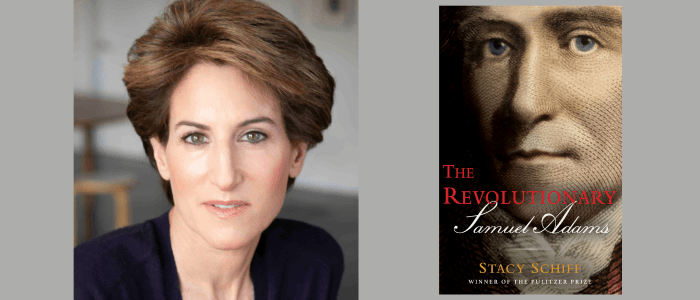William Hickling Prescott Award Ceremony & Conversation

MHS Event
Stacy Schiff in conversation with Megan Marshall, Emerson College.
This is a hybrid event. FREE for MHS Members. $10 per person fee (in person). No charge for virtual attendees or Card to Culture participants (EBT, WIC, and ConnectorCare). The in-person reception starts at 5:00 and the program will begin at 6:00.
In-person sold out
Join us for a special award ceremony followed by a conversation between two Pulitzer Prize-winning biographical authors.
In recognition of her career as an essayist and award-winning author, Stacy Schiff will be presented with the William Hickling Prescott Award for Excellence in Historical Writing by the The National Society of The Colonial Dames of America in Massachusetts and the Massachusetts Historical Society. In a conversation following the award presentation, Schiff and interlocutor Megan Marshall will discuss how authors approach wide-ranging subject matter, the process of writing biographies, and the importance of archives such as the MHS.
In her most recent book, The Revolutionary: Samuel Adams, Stacy Schiff brings her masterful storytelling skills to Adams’s improbable life, illuminating his transformation from aimless son of a well-off family to tireless, beguiling radical who mobilized the colonies. Winner of the 2000 Pulitzer Prize for her book Véra (Mrs. Vladimir Nabokov), Schiff has also brought figures like Benjamin Franklin, Cleopatra, and the alleged witches of Salem to life in bestselling, widely acclaimed biographies.
American scholar, writer, and biographer Megan Marshall won the 2014 Pulitzer Prize for Biography or Autobiography for Margaret Fuller: A New American Life. A past president of the Society of American Historians, she teaches nonfiction writing and archival research in the MFA creative writing program at Emerson College where she was named the first Charles Wesley Emerson College Professor.
Hybrid Event
The in-person reception starts at 5:00 and the program will begin 6:00 PM. If you have questions about the in-person event, please contact Olivia Sayah at 617-646-0580, or osayah@masshist.org. The virtual program begins at 6:00 PM and will be hosted on the streaming website YouTube. Registrants will receive a confirmation message with attendance information.
By registering you are agreeing to abide by the MHS Visitor Code of Conduct.
